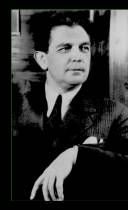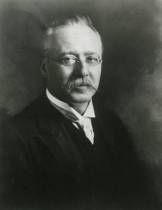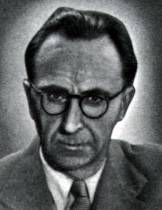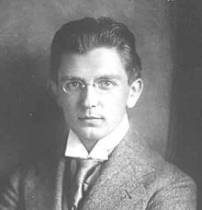
Alfred Höhn (20. Oktober 1887 in Oberellen bei Eisenach - 2. August 1945 in Königstein im Taunus) Alfred Höhn war ein deutscher Pianist, Klavierpädagoge und Herausgeber eines großen Teils der Klaviersonaten sowie einzelner Klavierstücke Ludwig van Beethovens für die Edition Schott.
Höhn
war zunächst Schüler am Hoch’schen Konservatiorum in Frankfurt am Main. Von 1907 bis 1908 war er dann Schüler von Lazzaro Uzielli an der Musikhochschule in Köln. Daneben Studien bei Eugen d’Albert und Ferruccio Busoni. 1910 wurde er Meiningen’scher Hofpianist. Im selben Jahr gewann er in St. Petersburg den Rubinstein-Preis vor Arthur Rubinstein, der in seinen Memoiren Erinnerungen: die frühen Jahre ausführlich über diesen Wettbewerb berichtet und keinen Zweifel daran lässt, dass er eigentlich den 1. Preis verdient hätte und Hoehn vor allem wegen Protektion durch seine adeligen Gönner gesiegt hätte. Er ist aber fair genug, einzugestehen, dass
Höhn
, mit dem er sich während des Wettbewerbes gut verstand, mit seiner Interpretation von Beethovens Hammerklaviersonate op. 106 eine meisterliche Leistung vollbracht habe, während er selbst nur die kleinere e-moll Sonate op. 90 vorgetragen habe. 
Max Fiedler (21 December 1859 – 1 December 1939)
Max Fiedler was a German conductor and composer, born August Max Fiedler in Zittau, Saxony, Germany. He was especially noted as an interpreter of Brahms. He first studied the piano with his father, who conducted the accompanying orchestra when Max made his first public appearance at the age of ten in 1870, playing Mozart’s Piano Concerto in A, K.488. Continuing his musical studies in Zittau with the organist Gustav Albrecht, who had been a pupil of Mendelssohn, Fiedler then entered the Leipzig Conservatory in 1877, where the director, Carl Reinecke, was his piano teacher. He graduated in 1882, with exceptional honours, alongside his friend and colleague Karl Muck. Fiedler also studied composition and was active in the city’s musical life, developing a close relationship with Julius Spengel, a friend of Brahms. Fiedler himself knew Brahms sufficiently well for the composer to ask him to substitute for him in a performance of his Piano Concerto No. 2, an invitation which Fiedler politely declined. He almost certainly heard Brahms conduct the first Leipzig performances of his Symphony No. 2 early in 1878 (though Ethel Smyth later wrote that Brahms "had the knack of rubbing orchestras the wrong way... Moreover, the Gewandhaus musicians were antagaonistic to his music") and his Violin Concerto on New Year's Day, 1879, with the dedicatee, Joseph Joachim, as soloist, though Jan Swafford writes that it "turned out a scrambling affair, with Joachim unnerved by all the last-minute revisions and Brahms even more tense on the podium than usual." As a young man he conducted Brahms' Symphonies in the presence of the composer who, not given to reticence when expressing himself, does not appear to have complained of Fiedler's interpretations.

Hans Rosbaud (July 22, 1895 – December 29, 1962) Hans Rosbaud was born in Graz, Austria. As children, Hans and his brother Paul Rosbaud performed with their mother, who taught piano. Hans continued studying music at the Hoch Conservatory in Frankfurt am Main, under the tutelage of Bernhard Sekles in composition and Alfred Hoehn in piano. Rosbaud's first professional post was in Mainz, starting in 1921, as the music director of the city's new School of Music, which included conducting the municipal symphony concerts. He became the first chief conductor of the Hessicher Rundfunk Symphony Orchestra (later the Hr-Sinfonieorchester) of Frankfurt in 1928. During the 1920s and 1930s, he presented premieres of works by Arnold Schoenberg and Béla Bartók. During the Nazi era, his freedom to present new music was restricted. In 1937, he became the general music director of the city of Münster. In 1941, Rosbaud took the same position in Strasbourg, heading the Orchestre philharmonique. In 1945 he was named music director of the Munich Philharmonic by United States occupation authorities. In 1948, Rosbaud's contract with the Munich orchestra was allowed to lapse because the city authorities wanted to move the orchestra's repertoire in a conservative direction. That year Rosbaud became the first chief conductor of the South West German Radio Orchestra in Baden-Baden, where he remained for the rest of his life. In 1954, he conducted the first performance of Schoenberg's opera Moses und Aron on 8 days' notice, and this performance was preserved on a 1957 commercial recording for Philips. He regularly took the SWR Symphony Orchestra to festivals of contemporary music, such as at Donaueschingen. He died in Lugano, Switzerland.
**************************************

Johannes Brahms Concerto for Piano no 1 in D minor, Op. 15 Grosses Berliner Funkorchester Max Fiedler 26.10.1936 (Haus des Rundfunks, Berlin) Sergei Rachmaninov Concerto for Piano no 2 in C minor, Op. 18 Frankfurt Funkorchester Hans Rosbaud 1.06.1937 (Grosser Saal, Frankfurt) Alfred Höhn, piano
**************************************
Материал взят из сообщества SymphonyShare.
| 
